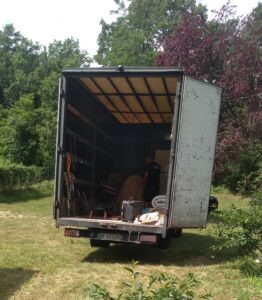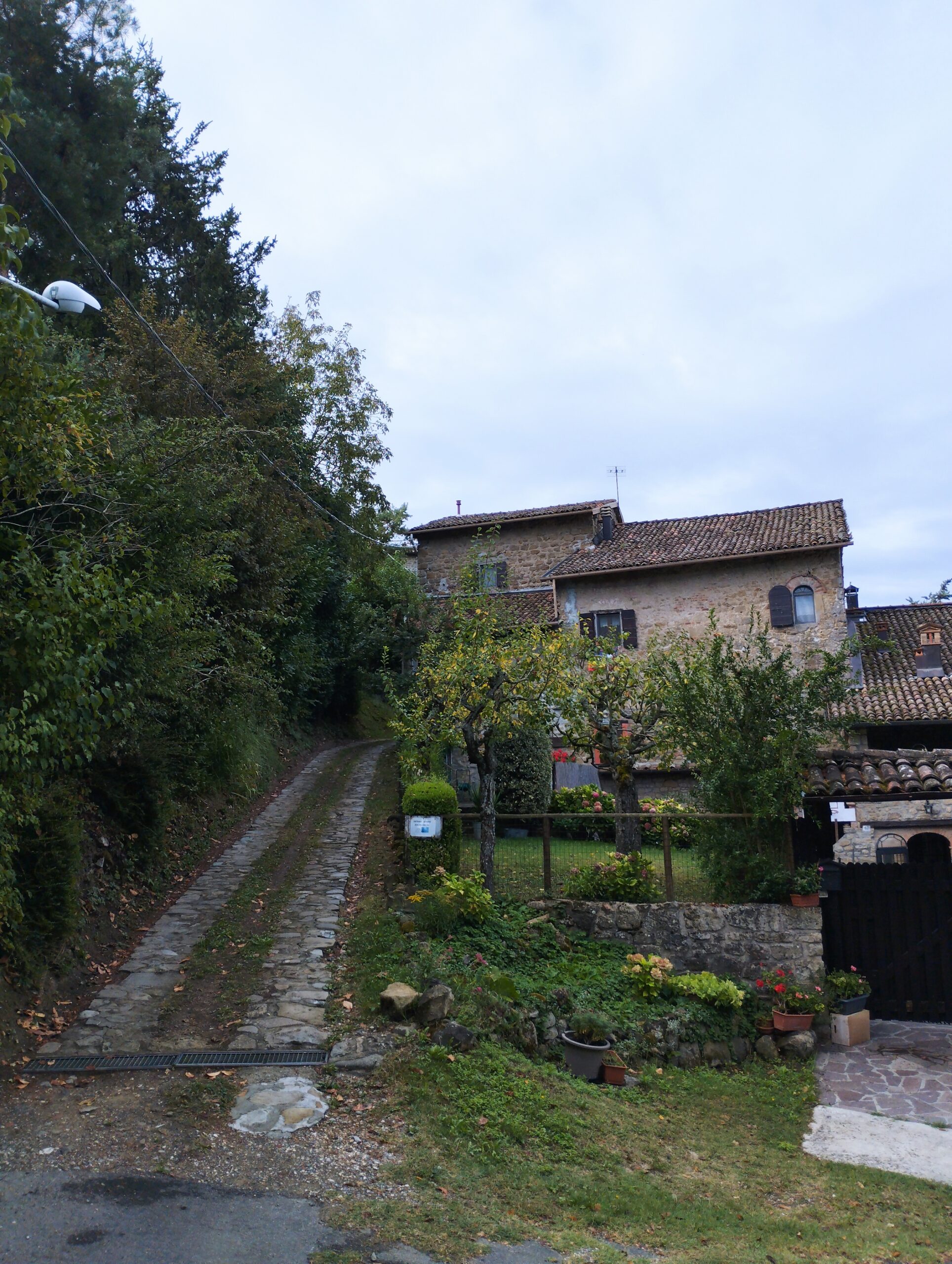
“The windows aren’t very big, are they?” Franco looks up, and I follow his gaze. No, they aren’t. I’ve measured them.
“Those are the biggest,” I say, pointing to the third floor.
“Let’s go and have a look inside.”
Together, we enter our very solid and extremely fifteenth century tower-house -me with nervous anticipation, Franco armed with his trusty measuring tape. He shakes his head as he climbs the first spiral staircase. Then, in the living room, he stops, a satisfied expression spreading across his face.
“Che bellissima casa, What a beautiful house.” His admiration is palpable. “The masonry, the restoration—it’s so well done.”
Franco’s full name is Francesco, but three syllables for a first name is excessive in this part of italy. Rosanna becomes Ross, Fabrizio is Fabri, and Aurelio doesn’t get beyond Reli. Franco and his brothers run a business specializing in renovations, removals, restorations, road maintenance, and painting—inside and out. Franco may have arrived as a mover, but now the mason in him has emerged, admiring the craftsmanship.
I completely agree. It’s one of the reasons we bought this house. But what I really want to know is whether he’ll agree to move us here.
The first two movers I called politely declined after seeing the photos of the house. A casa torre in a borgo, four floors, narrow alley? They weren’t even tempted.
Franco’s sister, who of course also works in the family business, had to check. Could I send some photos and the address? Against my better judgment, I allowed myself to hope.
CONTACT SRL was the last moving company in the area. Beyond them, it would mean calling someone from Bologna—or even farther out.
The next day, Franco calls. “I can be there in thirty minutes. Does that work for you?”
I drive far too fast to Casigno, only to find that Franco’s “thirty minutes” are more like sixty. But he actually came, and that’s what matters.
“Sì, veramente bellissima,” he says. “Yes, truly beautiful.” We’ve reached the fourth floor, and he’s admiring the view. Again, I agree wholeheartedly, but the move, will he take on the move?
“Naturalmente, non c’è problema, Of course, no problem at all.”
I try not to cheer out loud and settle for shaking his hand instead. For appearances sake we haggle a bit about the date and the price. But my heart isn’t really in it.
“Can you stop by the office tomorrow to sort out the paperwork?”
Apparently, my relief is still written all over my face.
“Avevi dubbi?” Franco asks. Did I have doubts? Oh, absolutely. But now we have a mover, and life is good.
Three weeks later, a moving truck inches its way down the narrow street in front of our new home. Except it’s not officially ours yet—the rogito, the final transfer of ownership, isn’t for another week. The transfer of our old house is tomorrow.
Being Dutch, we carefully considered every option for bridging the gap: storing our belongings—but where? Delaying the move—but what about the buyers of our house? We couldn’t find a solution. In the end, we asked the estate agent if he had any ideas or contacts.
Without a word, he grabbed his phone and called… the seller. Three minutes later, it was arranged. “Just let us know the moving date, and you can put your things in the house ahead of time. No problem at all.”
And so here we are, standing with the sellers on the front steps, watching as a two-meter fifty-five truck navigates a two-meter seventy alleyway. Setting up the moving lift turns out to be trickier than expected—it has to fit between the power lines.
“It’ll never work,” I mutter, as Franco climbs the stairs. My heart sinks. Is this the end of the move?
“Scusami, ma hai un rastrello?” Franco asks the seller. A rake, of all things.
The seller fetches one from the basement, and without any fuss, the wires are nudged aside to make room for the lift. I do my best not to think about how many safety regulations he has just violated. Franco doesn’t seem bothered in the slightest.
It’s been oppressively hot all day, and the movers’ T-shirts are long gone as they start hoisting the first boxes up. The seller and his wife take the opportunity to show us a few things now that we’re all here. The paintings? They’ll stay. So will the rugs, and most of the furniture.
I had secretly hoped the collection of dusty bottles I spotted on the first visit might also stay, but no—the Barolos and Chiantis are gone.
The seller demonstrates the hotel-style light switches on every floor—a system we still haven’t fully mastered—when an enormous crash nearly gives us all a collective heart attack. The lights go out.
Certain the lift has snagged a power line, I run to the window, only to breathe a sigh of relief as I see it’s still moving. The culprit is a lightning strike, five hundred meters away. Moments later, hailstones begin pelting down, and even Franco decides it’s enough.
“It’s half past twelve. Pranziamo e finisciamo dopo. Let’s eat and finish later.”
He’s baffled when I suggest we all have lunch together.
“Pago io” Isay. “It’s my treat,”
This only adds to his confusion but he grudgingly consents. The sellers decline our invitation, but before they leave, they hand over the house keys—and the spare set.
“because you never know and you’ll have them next week anyway.”
After a hearty lunch—primo, secondo, and a carafe of wine—the movers get back to work. The storm has passed, leaving a brilliant blue sky and there’s only the faint scent of ozone that reminds us of the meteorological violence an hour ago.
By late afternoon, we close the front door. Everything is inside. The truck edges backward as an ancient Fiat, barely roadworthy with a numberplate from before the Gulf War, blocks the narrow street.
“Ancora non avete finito?” the driver shouts. “Still not done yet?” He grumbles.
He reluctantly reverses to make way, loudly muttering his displeasure. After an interminable wait of three full minutes, he parks next door and disappears around the corner without a glance in our direction.
A cheerful woman in a bright orange scarf strides up the path and greets us warmly.
“I see you’ve already met Falco.” We introduce ourselves and learn her name is Diana. Hers is the second house, after Falco’s.
“Falko keeps to himself. Lascia stare. Don’t worry about it—it’ll be fine.”
Would we like a drink? We’ve barely moved in. But this is the borgo, this is home.
